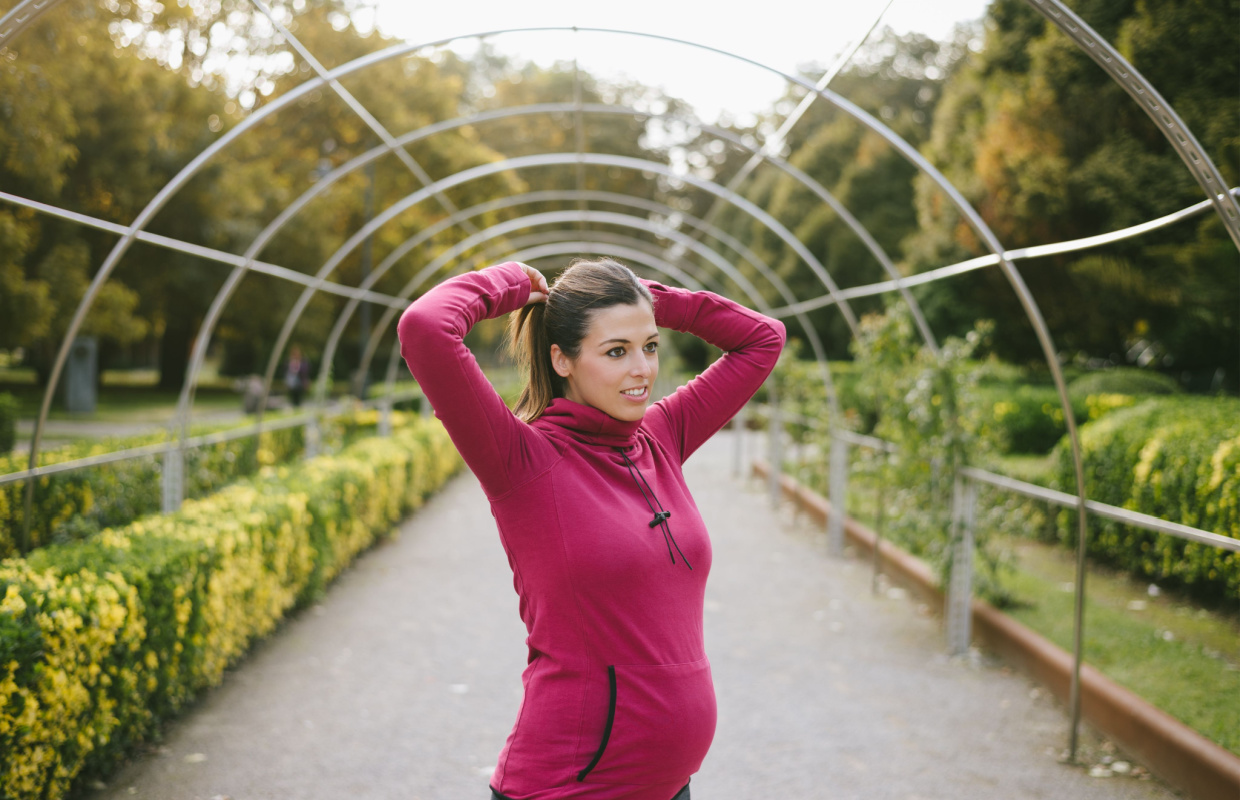If you’re pregnant, you might be feeling a little apprehensive about heading outdoors to exercise – especially now days are rainier and the evenings are darker. We caught up with Sarah Campus, PT and founder of LDN MUMS FITNESS, who shares her top safety tips on how to exercise safely throughout the colder winter months while pregnant…
Related: Fitness during pregnancy: how to exercise safely
How to exercise safely during winter when pregnant
1. Wear weather appropriate layers
If you want to exercise safely during the winter months while pregnant, the first step is getting the right kit. ‘Although you don’t run the risk of overheating in the winter, like you do when you are running in the warm weather, you must be careful about wearing enough layers,’ Sarah explains.
Why is this especially important for pregnant women? ‘Our internal temperature is naturally higher when we are pregnant, so you may feel comfortable when it is quite chilly out. However, while you may feel comfortable and not want to wear more clothes, it is best to be aware of the weather and what should be worn. Be mindful of things like hats and gloves. Our immune systems are more susceptible to getting sick when we are pregnant so make sure to wrap up!’ Sarah tells us.
Related: Pelvic floor workout: 7 best exercises after pregnancy
2. Watch your footing
While everyone ought to be careful when running on uneven terrain, this is of even greater importance for pregnant women. ‘One of the main concerns is slipping and falling, as this is extremely dangerous for a pregnant woman. It could harm not only the mother, but her baby too,’ Sarah explains.
‘Be mindful of the footing on the trail or road and pay attention to your surroundings. If it is snowy and uneven or icy out, it is probably best to stay inside choose an alternative exercise, even jogging on the spot is good,’ Sarah suggests. ‘Or, if you must go outside, it may be best to switch to walking for the day,’ Sarah suggests.

We lose more fluids when we are pregnant because our body has to work harder with the extra weight. Pay attention to your thirst signals and get in the habit of always having a water bottle around.
3. Stay hydrated
It’s also crucial to keep your fluid levels topped up while you’re pregnant (although this rule applies to everyone, especially when exercising!). ‘Hydrating enough pre- and post-run is another important factor to keep in mind. Although you cannot physically see the loss of fluid from a run like you can in the hot months, running in the cold can dehydrate you. It is important to drink at least 500ml extra before and after the run to replenish fluid loss.’
Why is this more important for pregnant women? ‘We lose more fluids when we are pregnant because our body has to work harder with the extra weight. We also have a higher fluid volume in our bodies when we are pregnant,’ Sarah explains. ‘Pay attention to your thirst signals and get in the habit of always having a water bottle around.’
Related: Best maternity activewear for pregnant women
4. Always put your safety (and your baby’s) first
If you want to keep up with your running throughout the winter months, it’s important to take certain measures to ensure both you and your baby stay safe. ‘A few other important factors to keep in mind when running in cold weather while pregnant include staying on a well-known route and carrying a phone with you in case you need to call family to come get you. In all situations, not just cold or hot weather, safety should be put first,’ Sarah explains.
‘Meet up with a buddy if you can. This is not only important for accountability and social purposes, but it is also a great idea for safety purposes too. Plan to run when there’s good lighting, sometime during the middle of the day, if possible. Try to avoid running when it is dark during the winter, as this poses more of a threat for slipping or tripping on surfaces you can’t see,’ Sarah adds.
5. Listen to your body
We should always listen to our bodies when exercising – but this is even more important when pregnant. ‘Get to know what level of effort is appropriate for the day and how pregnant you are,’ Sarah suggests. ‘It is always wise to speak with your doctor prior to exercising and figure out if there is a heart rate maximum you should shoot for. This may change in the colder months, as it is harder for your body to process the cold air being breathed in and out.
‘Keep in mind that although it may not seem like it, just running in colder air creates more of a resistance your body needs to deal with. And the most important thing is to remember to have fun and enjoy yourself!’ Sarah adds.
Remember: if you don’t feel up to running, that’s okay! ‘Many women find that as their pregnancy progresses, they can’t run fully anymore and must switch to walking or run-walking. This is okay and is actually a great form of exercise!’ Sarah explains. ‘Make sure you are listening to your body and giving the best effort for your body and your growing baby.
‘Most importantly have fun and enjoy pursuing training while pregnant. It is a wonderful gift to be able to continue to run while pregnant. Treat your body with respect and enjoy the process!’
For more tips on training outdoors this winter, follow Sarah on Instagram @LDNMUMSFITNESS
Related: Cycling after pregnancy: post-natal bike fitness tips








